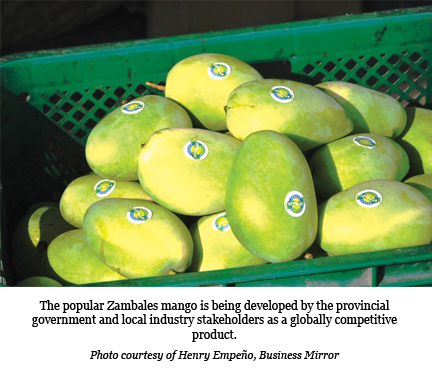by Henry Empeño, Business Mirror
The Zambales provincial government is seeking a P200-million grant from the Department of Agriculture (DA) for the development of the local mango industry and the promotion of the popular Zambales sweet mango as a world-class product.

Gov. Hermogenes Ebdane Jr. said in a meeting with stakeholders here that his Capitol staff are now formulating a Prime Commodity Investment Plan (PCIP), which is a prerequisite for grant applicants under the DA’s Philippine Rural Development Program (PRDP).
“We have formed a technical working group to work on the PRDP application, that’s why we are conducting this workshop to get your inputs,” Ebdane explained.
He also reminded government planners and local mango stakeholders to review all angles of the industry before mapping out strategies, pointing out that the returns of investment should surpass the cost, most especially the social cost.
Letty Viernes, manager of the Provincial Planning and Development Office, said that, prior to the PCIP preparation, concerned departments at the Capitol have already formulated a value-chain analysis for mango, which is a prime product of the province of Zambales.
Viernes said the workshop is the culmination of months-long studies jointly made by the provincial offices for agriculture, planning and development, environment, and engineering, in consultation with local mango growers.
She added that, in another workshop held last month, mango stakeholders identified several constraints that hamper the development of the local mango industry. These included lack of nursery for the propagation of indigenous mango varieties; high cost of production inputs; poor marketing; and revenue losses from unsold harvests.
The group then concluded that the provincial government and its private- sector partners would need to implement measures to boost local mango production and ensure its development as a prime product.
Dr. Rene Mendoza, chief of the Provincial Agriculture Office, said among the priority measures identified to prod the development of the local mango industry are the establishment of nurseries to increase the availability of quality planting materials, particularly of the indigenous Sweet Elena and King Rudolph varieties, and the setting up of check points to monitor entry of seedlings, fertilizers and other materials used in mango farming.
The government, he added, would also need to put up a trading center, where growers and traders could do business, and build postharvest facilities, where locally harvested mango fruits would be labeled and packed identically as Zambales mangoes.
A processing plant, where unsold mangoes could be made into purees and juices, would also have to be built, along with more farm-to-market roads to speed up the transport of harvests to trading centers, Mendoza added.
During the recent workshop, Ebdane, likewise, stressed that the Zambales mango is best served fresh and it must be promoted so.
“Our mangoes are already known as the most delicious in the world,” Ebdane said. “The methods other provinces or countries employ in producing their mangoes may not be applicable to varieties that are indigenous to the province, so let us be mindful of our plans here,” he added.
In applying new technology, Ebdane also advised growers to consider the quantity of yield against the deterioration of the quality of Zambales mango.
The popular Zambales mango is being developed by the provincial government and local industry stakeholders as a globally competitive product.
Source: Business Mirror
